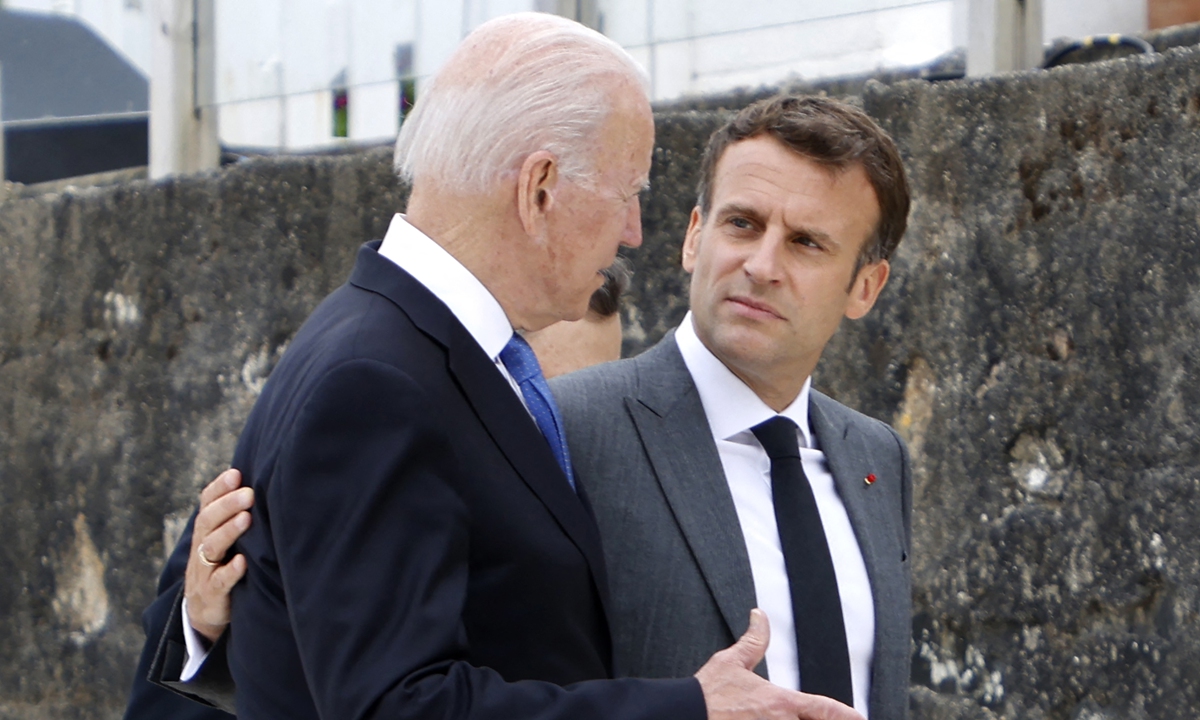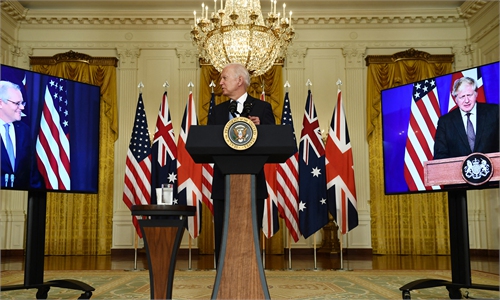
US President Joe Biden (left) and France's President Emmanuel Macron speak at the start of the G7 summit in Carbis Bay, Cornwall on June 11, 2021. Photo: AFP
Washington has once again stabbed its allies in the back after the troop withdrawal from Afghanistan. This time, the victim is France.
Last week, the US, Australia and the UK formed a trilateral security partnership, known as AUKUS. Meanwhile, it urged Australia to break its submarine deal with France by offering US nuclear power technology. As French Foreign Minister Jean-Yves Le Drian said in an interview Saturday, there is a "serious crisis" between the allies which will affect NATO's future. Le Drian's remarks triggered a heated debate: Will France break up with NATO after being stabbed in the back by the US?
France has lost a contract worth 31 billion euros ($36.5 billion) and, more importantly, its face. France has always boasted about its global influence, especially in the Indo-Pacific region, in recent years. With a total of 8,000 French soldiers stationed in the region, it has the biggest military presence among Western countries after the US. France has also been participating in a series of US-led military exercises there.
But Washington unexpectedly snatched Paris's submarine deal. Besides, it has left Paris in the dark when forming a new security alliance with London and Canberra that focuses on the Indo-Pacific region. Paris might now feel that the US doesn't take its oldest ally seriously.
The impact of this incident will spill over into next year's French presidential election. After four years in office, President Emmanuel Macron now faces difficulties in fulfilling most of his promises to the voters. Only his achievements in foreign policy are somewhat recognized by the French public. But just as the presidential election approaches in France, what the US has done overturned it all.
Even so, the Macron administration still acts cautiously. First, France's dissatisfaction was expressed by Le Drian with a non-diplomatic tone and language. It leaves room for the future. Second, France canceled Washington's reception, toned down celebrations of the US-French Revolutionary War victory, and recalled its ambassadors to Washington and Canberra. Third, France has been seeking EU support in this case, turning the controversy between Paris and Washington into an issue over transatlantic ties. It is a tactic to increase France's own leverage and to prevent the scenario of fighting alone. In the end, France sent out a signal, whether by accident or on purpose, that it may pull out of NATO.
Yet only a few politicians in France, such as far-left Jean-Luc Mélenchon, have raised serious voices to call their country to withdraw from NATO. Paris' official attitude over the case is so far vague. This is undoubtedly an important "card" in Macron's hand. The Biden administration is paying great efforts to gang up with allies against China. So this is not good news for the US.
According to CNBC, US President Joe Biden on Sunday requested a call with Macron. On Wednesday, Biden and Macron made their first call after the diplomatic crisis exploded over the AUSUS deal. Macron agreed to return his ambassador to Washington. It seems that both sides are trying to deal with the crisis.
But still, in theory, France's "withdrawal" from NATO is not an illusion. France has always pursued independence in defense and has a history of warning to withdraw from NATO. There is no psychological barrier for the country to break up with the bloc again. On the other hand, Macron has repeatedly expressed his disappointment with NATO. He even once described NATO as being "brain dead."
Yet from a practical perspective, it is not that easy for Paris to withdraw from NATO. Divorcing from the alliance depends on how France calculates its interests.
First, even in 1966, after then French president Charles de Gaulle announced that he was pulling out of NATO's military structure, he did not take his country entirely out of it.
Second, EU has a long way to go to achieve defense independence, and its strategic autonomy is hard to be realized. The withdrawal from Afghanistan is an example. The EU is not able to act alone without the support of the US. This is an embarrassing reality that France has to admit and face. Even its counter-terrorism operations in the Sahel region of West Africa cannot function well without NATO's intelligence and logistics systems.
Third, even if France is willing to withdraw from the NATO, it will be difficult to win EU's support.
France may not quit NATO right now. But France has made more European countries see how it is treated by the US. It will then seek more bargaining chips from Washington. It will not let the US act arbitrarily at its will any more.
Nevertheless, this does not mean that the withdrawal will never occur. After all, Europe's trust in the US is continuously degrading.
The author is a professor at the School of International Relations, Beijing Foreign Studies University. opinion@globaltimes.com.cn

